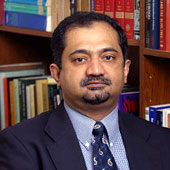Egypt’s Lead in the Arab World
Is Egypt still the political and cultural center of the Arab world?
August 31, 2003
Egyptian cinema — popular in the entire Arab world for over a half century — has greatly shaped contemporary Arab culture. Egyptian thinkers have also been dominant among secular Arab voices.
From an Islamic perspective, the presence of Al Azhar University in Egypt — the historical center of Muslim learning — adds to the influence that Egypt exercises over the Islamic consciousness of the Arab world.
Several streams or ideas — seen as Islam liberalism (as manifest by the ideas of Khalid M. Khalid), Islamic modernism (à la Muhammad Abduh and Rashid Rida), Islamism (as in Hassan Al Banna and Syed Qutb) and Islamic moderation (as in the works of Muhammad al Ghazali) — have all originated in Egypt. Islamic Marxism as in the works of Hassan Hanafi has also found a place in the voices of Egypt.
Discourses emerging from Egypt, both secular as well as Islamic, have shaped the frames of references employed by Arabs elsewhere. It should therefore come as no surprise that there has been no Arab-Israeli war ever since Egypt made peace with Israel.
The fact that Washington continues to invest nearly $2 billion dollars every year as "renewal fees" for Egyptian cooperation in the region is also indicative of Egypt's geopolitical importance.
For all these reasons, in order to understand the present and the future of the Arab world, it is important to monitor the pulse of Egypt.
In the last 50 years, two powerful and antithetical ideas emerged from Egypt that continue to shear the internal dynamics of the Arab world. These ideas/movements are Arab socialism and Muslim brotherhood.
While the first idea gained popularity as a surrogate to the popularity of Jamal Abdel-Nasser, the second gained momentum after the execution of Syed Qutb.
These two trends are the backbones of Arab politics today. While Arab socialism is embedded in the state machinery, Islamic resurgence is taking a strong foothold in civil society.
As a rule of thumb, Egypt's strengths are Arab strengths and Egypt's weaknesses are Arab weaknesses.
The absence of democracy and the continuation of authoritarian regimes in Egypt undermine the prospects for democratization in the entire Arab world. Similarly, the Egyptian method of containment of Islam — through repression and co-optation — by the state apparatus is replicated in the rest of the Arab world.
If there is to be a change in the socio-political context of the Arab world, then that change must begin in Egyptian society.
It is not for nothing that the United States subsidizes the Egyptian state machinery's capacity to keep a tight control on the trends within Egypt.
The Palestinian cause has literally been surrendered by the Arab world since the famous Camp David accord between Egypt and Israel. Today, Egypt plays the role of the moderator.
Every time there is anger — and Arab states determine to take some punitive action against Israel — Egypt's leadership call for a summit to promote a moderate response.
In essence, the primary role of Egypt's President Hosni Mubarak is to keep the Arab response to Israeli atrocities within acceptable limits. In effect, making Egyptian foreign policy means shaping Arab foreign policy.
The Islamic movement in America is also strongly influenced by Egypt. Many prominent American Muslim organizations have been created — and are still managed — by individuals with strong ties to the Ikhwan Al-Muslimeen (Muslim Brotherhood).
Azhari University scholars continue to enjoy great respect and hold several jobs as Imams in American Mosques. As Imams, they control the Friday sermons — and, therefore, the interpretation of Islam in America.
What makes it so hard to read the pulse of Egypt is that it is at once both a stagnant and vibrant society.
It has managed to remain intellectually alive — without fully transforming itself. And it has continued to remain backward and underdeveloped —without fully losing the vitality of its soul. Egypt is like Islam in Egypt. It is there, not in control — but not completely subdued either.
Muslim intellectuals in Egypt are gradually realizing that neither Arab socialism nor Islamic revivalism has succeeded in addressing the many problems of Egypt — as well as the Arab world. There is at least an emerging consensus in Egypt that, whatever the future of Egypt, Islam will play a central role.
What is not clear is what that role will be and who — the state Ulema, the traditional scholars or the Muslim Brotherhood — will provide the dominant interpretation of Islam.
Until these questions are settled, Egyptian society will not stabilize. And neither will the Arab world.
Read previous
Global Gol!
August 30, 2003
